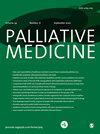患者和家属对农村姑息关怀模式的看法:系统回顾与元综合
IF 3.6
2区 医学
Q1 HEALTH CARE SCIENCES & SERVICES
引用次数: 0
摘要
背景:世界上几乎有一半的人口生活在农村地区。如何最好地为农村人口提供姑息关怀尚不明确。目的:确定有姑息关怀需求的农村患者及其家属认为姑息关怀的关键要素,这些要素对他们获得良好生活所需的关怀和支持至关重要。设计和数据来源:在Prospero(CRD42020154273)注册的系统综述和荟萃。2024 年 6 月对三个数据库进行了检索。采用托马斯和哈登的三阶段专题综合方法提取和分析原始定性数据。结果:在 10834 篇已确定的论文中,有 11 篇符合纳入标准。对提取的原始引文(n = 209)进行元综合后,发现了三大主题:(1)尊重患者与其全科医生(GP)的现有关系;(2)战略性地适时提供专科服务、临床医生和设备至关重要;以及(3)需要感到安全、做好准备并得到支持。全科医生是这些模式的核心,他们扎根于自己的社区,是通往专科姑息关怀服务的渠道。农村姑息关怀的病人和家属重视响应性关怀、轨迹指引、有效沟通、全天候支持,并认识到虚拟医疗的价值。在全球范围内,积极的公共政策和资金对于确保获得全科医生主导、专科医生支持的农村姑息关怀模式至关重要。本文章由计算机程序翻译,如有差异,请以英文原文为准。
Patient and family perspectives on rural palliative care models: A systematic review and meta-synthesis
Background:Almost half the world’s population lives in rural areas. How best to provide palliative care to rural populations is unclear. Privileging rural patient and family voices about their experiences of receiving care delivered via rural palliative care models is necessary.Aim:To identify the key palliative care elements that rural patients with palliative care needs and their families perceive to be critical to receiving the care and support they need to live well.Design and Data Sources:A systematic review and meta-synthesis registered with Prospero (CRD42020154273). Three databases were searched in June 2024. Raw qualitative data were extracted and analysed using Thomas and Harden’s three-stage thematic synthesis methodology. Findings reported according to the PRISMA statement.Results:Of the 10,834 identified papers, 11 met the inclusion criteria. Meta-synthesis of extracted, raw quotes (n = 209) revealed three major themes: (1) Honouring the patient’s existing relationship with their General Practitioner (GP); (2) strategically timed access to specialist services, clinicians and equipment is critical; and (3) a need to feel safe, prepared and supported.Conclusion:The strategic inclusion of specialists alongside primary care providers is integral to optimising rural palliative care models. General Practioners are central to these models, through being embedded in their communities and as the conduit to specialist palliative care services. Rural palliative care patients and families value responsive care, trajectory signposting, effective communication, 24/7 support and recognise the value of virtual health. Globally, positive public policy and funding is critical to ensuring access to GP-led, specialist-supported, rural palliative care models.
求助全文
通过发布文献求助,成功后即可免费获取论文全文。
去求助
来源期刊

Palliative Medicine
医学-公共卫生、环境卫生与职业卫生
CiteScore
7.60
自引率
9.10%
发文量
125
审稿时长
6-12 weeks
期刊介绍:
Palliative Medicine is a highly ranked, peer reviewed scholarly journal dedicated to improving knowledge and clinical practice in the palliative care of patients with far advanced disease. This outstanding journal features editorials, original papers, review articles, case reports, correspondence and book reviews. Essential reading for all members of the palliative care team. This journal is a member of the Committee on Publication Ethics (COPE).
 求助内容:
求助内容: 应助结果提醒方式:
应助结果提醒方式:


